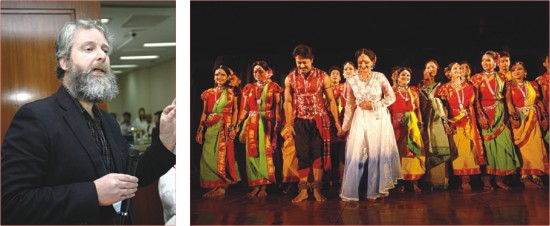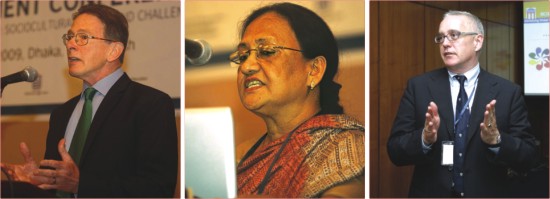| Spotlight
8th International Language & Development Conference, Dhaka
Tanzina Rahman
THE 8th International Language and Development Conference recently ended with experts addressing the challenges faced by the developing countries in regards to language development and socio-cultural issues. A total of 69 papers were presented during the conference, among which 43 papers where from local authors and 26 from international authors. British Council in partnership with the Ministry of Education and the Ministry of Foreign Affairs of the Government of Bangladesh, Department for International Development (DFID), University Grants Commission of Bangladesh and Institute of Education and Research of University of Dhaka, hosted the programme from 23 to 25 June at Pan Pacific Sonargaon.

The conference was held for the first time in Bangladesh where 220 participants attended the programme. Previously, the Language Development Conferences has been successfully conducted in other parts of the world including Thailand, Indonesia, Malaysia, Vietnam, Cambodia, Uzbekistan and Ethiopia. According to Professor Salma Akhter, Director of Institute of Education and Research, University of Dhaka, having the conference for the first time in Bangladesh has created a platform for attracting language policy makers, language learners, and development professionals from around the world.
This time, the 8th International Language and Development Conference was divided into five sub themes -- Language, Gender and Development, The Role of Language in National and Cultural Identity, Sociolinguistic Issues: Challenges and Opportunities, Capacity Building and National Development and Language and Technology. Both regional and international presenters had submitted their papers according to the respective themes.
Academics and professionals from the University of Dhaka, BRAC University, American International University Bangladesh, Independent University Bangladesh, Janhangirnagar University, East West University, United International University, Khulna University, Dhaka Shishu Hospital, Asian University for Women and others participated in the conference.
In addition to the local research papers, there were publications from The Open University (UK), Performance Improvement Project (Sri Lanka), University of Ibadan (Nigeria), International Network for Development (India), University of Leeds (UK), Wenzao Ursuline College of Languages (Taiwan), Jinnah Women University (Pakistan), Evergreen Valley College (USA), Victoria University (Australia), University of Sains (Malaysia), Orissa Primary Education Programme Authority (India), Mosaica Education (Qatar) and Simon Fraser University (Canada).


Professor Christopher Kennedy, Director of Centre for English Language Studies of University of Birmingham (UK) spoke as the keynote speaker during the first day of the conference. During his speech, he mentioned about a book which was published 30 years ago titled 'Can language be planned?'. He said the scenario back then portrayed in the book has changed and that we are now living in a globalised world where we use global language. He compared the language policy and development issues in this century that were discussed in the conference with the question raised in the book.
Plenary speakers during the conference were Dr. Syed Manzoorul Islam, Department of English, University of Dhaka, Dr. Sadeka Halim, Department of Sociology, University of Dhaka and Mustafa Jabbar, Chief Executive of Ananda Computers. Dr. Halim discussed how the use of language can marginalize and exclude women from development. She brought out the issues concerning gender and development where language has tremendous power to shape and influence the role and identity of women by means of texts, literature, media and others. The first day of the conference ended with a lively cultural programme followed by dinner. During the second day of the conference, Hamidul Haque, Assistant Professor of American International University Bangladesh opened up the day by presenting his research paper titled -- '

Does your choice of language equate to your choice of identity? Exploring the role of languages in education'. Harnunur Rashid Khan from East West University revealed some interesting facts regarding the underlining notion of the development of Bangladeshi English, also known as 'Banglish'. In his paper he tracked the inevitable evolution of 'Banglish' and questioned whether this hybrid language is effective for the nation. On the other hand, Dr. Nkechi M. Christopher, Lecturer of Department of Communication and Language Arts, University of Ibadan (Nigeria), Greg Dekker, Language, Education and Development (LEAD), SIL International and Dr. Pamela MacKenzie, Education Consultant of International Network for Development (India) portrayed case studies in relation to the language development and policy implementation in foreign countries.
The third day of the conference ended with riveting issues discussed by the speakers. Among them, Dr. Ya-Hui Kuo, Assistant Professor of Department of English, Wenzao Ursuline College of Languages (Taiwan) explained the language challenges faced by international graduate students at United States in his research paper. He mentioned recommendations and suggestions to international students that will prepare and assist them in adjusting, adapting, and overcoming their language challenges. Meanwhile, Paul Scott, Interactive Editor of BBC Learning English (UK) discussed BBC's experience globally as well as in Bangladesh in regards to the English language teaching, media and technology. Tanya Cotter, ICT Coordinator and Teacher, British Council Dhaka was the concluding speaker who gave a detailed overview of Internet as the tool for continuous teacher development in the conference.

As the conference concluded successfully, it left remarks and opened the doors to discuss key issues related to language and education reform policies for the government.
|
Copyright (R) thedailystar.net 2009 |

